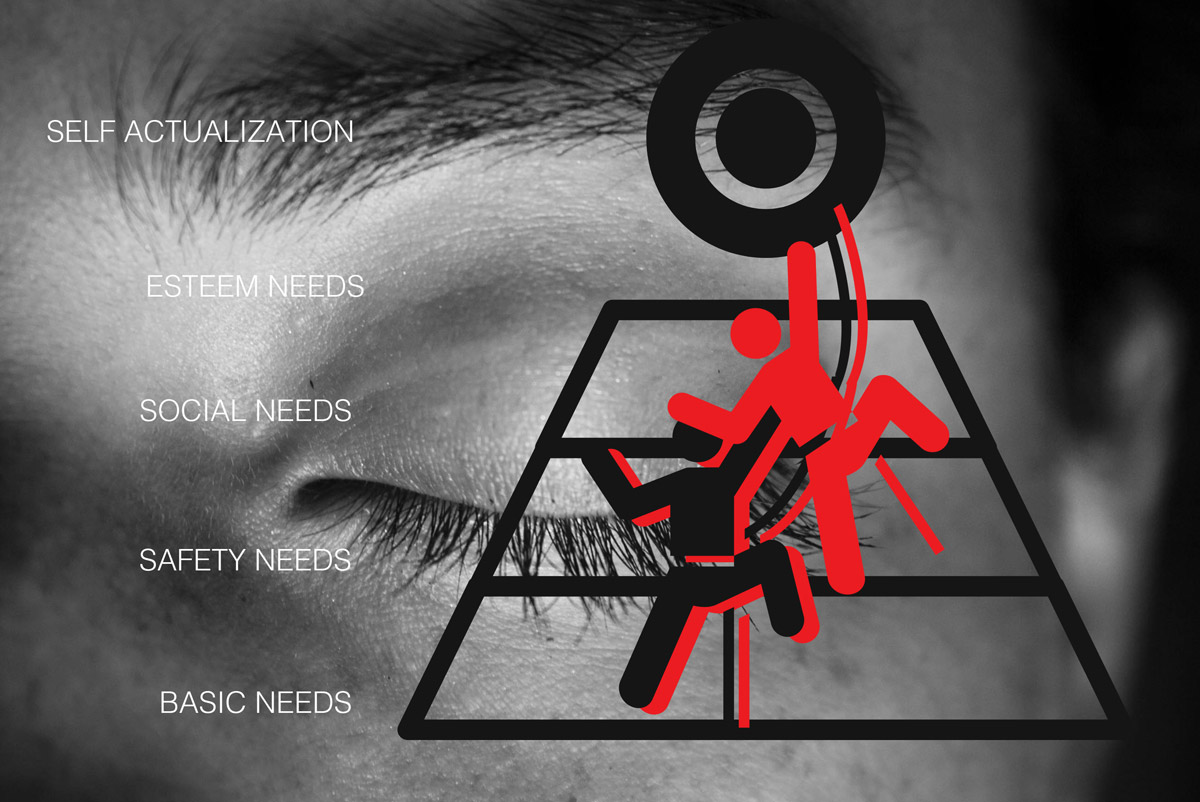
Why is it so hard to adapt?
Why is it so difficult to flow with the times?
Why, when all scientists agree on the implications of climate change, aren’t we able to take fierce action? Why did traditional media companies fail to adapt their business models in time, why do automotive OEM’s think they can build electric, connected cars by applying their knowledge of building combustion engines? Why is it a problem for some people to wear masks?
BEING ABLE TO ADAPT REQUIRES FREEDOM. THE FREEDOM OF CHOICE. EXTERNAL CHOICE AND INTERNAL CHOICE.
AGENCY versus SECURITY
As humans we have different needs that need to be catered to. These needs can be in conflict with one another.
One person who explored the relationships of these needs was psychologist Abraham Maslow. His famous pyramid of needs describes the order our needs. Maslow explains that we have needs, which are staged by order. The essence of Maslow’s pyramid is that needs at the bottom of the hierarchy must be satisfied before we can develop a true interest in the needs higher up. Our activities to satisfy the lower level needs then become a habit, enabling us to move up the pyramid.
We start with the basic needs like for example food, followed by the need for security to then get to the psychological needs, which include belonging and self-esteem. Only when those needs are fulfilled will we be able to focus on our self-fulfilment needs, or what is generally considered as personal growth.
These self-fulfilment needs are what the healthy personality can focus on, and they include exploring, experiencing, being interested, choosing, delighting, enjoying new things. In the workspace, according to Maslow this includes, being a prime mover, self-determination, having control over one’s own fate, being able to plan and carry out to succeed.
We have an inherent conflict between freedom to choose, the agency on the one side and our security on the other side. This is an internal battle, as described by Abraham Maslow, but it is also created by the trade-off's of the real world, which rarely let us have the cake while eating it.
AN INTERNAL CONFLICT
As humans we have different needs that need to be catered to. These needs can be in conflict with one another.
One person who explored the relationships of these needs was Abraham Maslow. The order our needs he described in his pyramid of needs. According to Abraham Maslow’s theory, we have needs that are staged by order. The essence of Maslow’s pyramid is that needs at the bottom of the hierarchy must be satisfied before we can develop a true interest in the needs higher up. Our activities to satisfy the lower level needs then become a habit, enabling us to move up the pyramid.
We start with the basic needs, followed by security to get to the psychological needs. Only when those needs are fulfilled will we be able to focus on our self-fulfilment needs, or what is generally considered as personal growth.
These self-fulfilment needs are the ultimate goal of the healthy personality, and they include exploring, experiencing, being interested, choosing, delighting, enjoying new things. In the workspace, according to Maslow this includes, being a prime mover, self-determination, having control over one’s own fate, being able to plan and carry out to succeed.

If we need to find food or a place to live, our mind won’t be open to this wonderful self-help seminar, that will open up our true creative-self. Or when we work for an organisation that does not fulfil our social needs, then we may not be able to reach our full creativity.

The never-ending battle between Security and Freedom
In our context, when we can focus on ungratified wishes for safety, then we will face difficulty fulfilling our esteem needs such as freedom and independence as well as self-actualisation, that helps us develop our full potential.
Read what Maslow said on the basic conflict between our defensive forces and growth trends:
EXTERNAL: THE TRADE-OFF
Now Maslow’s findings wouldn’t be so impactful if we could have the cake while eating it. If we can have freedom while having security, Maslow’s conflict might not become relevant too frequently.
Yet, they are highly relevant, because real life mostly forces us to make a trade-off between security and freedom.
Freedom to decide is crucial for us as independent human beings. But it also means being accountability for our actions if things goes south. We are accountable, we not only gain the returns, we also pay the price for our actions.

To pursue new options in times of change, to have ‘external’ choice, we need to expose ourselves. We need to take some risks. If the world is changing, or if we build something new, we don’t know the result yet. We don’t know where the path will lead us and whether this path may be an utter failure.
In addition, change puts at stake what we have achieved so far, triggering our need for security. It may become as obsolete, as mainframe computers, blackberry phones, traditional media business models, and combustion engines face obsolescence.
In this way, our freedom to choose the right option is limited by our needs for security. That’s the trade-off we have to deal with. To have security in life we have to give up parts of your freedom, and vice versa. Only seldom can we have full freedom and security at the same time
To illustrate this through a metaphor, in investing we also speak about risk adjusted returns. This means that the higher the returns you want to gain, the more risk you have to take. Another technical term for this is “there is no free lunch”. If you invest in a startup for example, let’s say you invest into “The Next Apple Inc”, then you have the prospect of extraordinary returns. But you also face a high risk. The chances that these prospects materialises are very low. We were being sold quite some Next Apples, Next Facebooks, Next Googles, and only few of them have become successes. If, on the other hand, you invest in bonds, your risk tends to be lower, you will get steady returns, which however are much lower than the returns from the startup investment.
The Past Decades Have Turned Us Into Stability Adicts
This is the basic human situation.
But this trade-off relationship between security and freedom has changed over the past decade. A whole new entitlement to security has entered our societies.
Why?
Over the years, the risks we face as a society have decreased. We don’t have to hunt for survival. Polio is not a threat to our health anymore. Neither is the plaque.
We have been given steady incomes and perceived job guarantees.
The cold war has been over for a while.

Over the past decades, we were fortunate to experience a long streak of stability. Economies in the Western World were booming, and the tempting offer was that in exchange for a college education and your dedicated time, you would get a fixed salary with the prospect of buying a house, getting married and having children, and entering into safe retirement.
A generation of corporate executives grew up and were educated in a time when job opportunities were plentiful and once in, then jobs were protected through strong market entry barriers, the economic moats of their employers. Banks cashed in the upsides from highly risky transactions, and when the sh*t hit the fan, government bailed them out. Many lost their jobs, in particular the younger ones had to rethink what their careers were about. But then there were the older ones who had amassed enough wealth to continue a highly comfortable live in the safety zone. Risk was transferred to society, the ultimate insurance company.
Over these past decades we have been provided with a distorted image. These decades of continuous growth and stability have provided us with the impression that we can have the cake while eating it. We were told that we have a right to the upsides without the risk. We have lost a unified measure for accountability.
This deal has created a false sense of entitlement to the status quo.
What we see now, is a misperception of these risk adjusted returns. To conclude the metaphor, people have been told the illusion that they can have guaranteed returns by investing in startups. They have been given the impression that there are free lunches available. Free lunches and free refills. So why leave the restaurant then?
Coming from this stable environment into the rougher seas, it is tempting to try to retain that perceived stability from the past by whatever means necessary.
Back To The Old Rythm
As we have explored, now the volume of change has been turned up again. For those who come from the smooth riding era of stability, experiencing the triplet of digitization, climate change and corona may seem a bit overwhelming from time to time.
Unfortunately fear can have an impact on our behavior, from consumption patterns to voting behavior.
The media can even reinforce that fear of change by reporting on perceived dangers that derive from this changing world. When they move statistically insignificant incidents to significance through prime time televisions, they create a feeling of imminent danger for people.
Change, Disruption and Crisis tends to be positioned as something evil, something that harms us. Media headlines tend to be focused on how we can preserve the status quo, and on the threat that the crisis provides. From politicians, we hear that “this is a new situation”, when they have problems finding the right path of action. For corporates, the term “disruption” has become the go-to term, when it comes to justifying that competitors are taking the lead.
Thinking of it, the term “Disruption” is quite a negative term. Your train can get disrupted. There is no value in this, is there? Traffic can get disrupted. “No, not another traffic jam please.”
So our terminology has replaced the proactive, positive term “innovation” by the defensive, negative term “disruption.” I guess Clayton Christensen did not write his book with a smiley face on his desk.
Lesson: it’s not you, it’s me
The lesson is that the need for security and fear of change is a powerful force for us human beings.
But then there is something else.
The problem is not disruption, the problem is how we react to it.
Change and Disruption is not a thing that just happens, and that we can’t do anything about. Quite the contrary, we have agency, we can react to change, we can develop new options.
Fear vs Fear
Fear can be a helpful survival mechanism. Climbers do worry before they climb a free solo, leaving the rope at home. Founders have sleepless nights. Athletes worry before their matches. And that is just natural. It helps us be alert of what can happen. That doesn’t mean however that we should not challenge ourselves to cross that line to the unknown.
But fear is not necessarily a bad thing. There is an irrational fear and there is a rational fear. If you are in Europe and you are afraid of a spider, that’s quite irrational. If you are in Australia, and you are afraid of spiders, that’s rational.
In private equity, when developing plans for the future, we focused on those elements that we or the management teams of our portfolio companies could control, versus those that we had no control over. Focusing on the initiatives that you can control, and keeping alternative scenarios in mind can take you a long way.
In a more extreme fashion, Alex Honnold, one of the most famous climber's of these days, said in an interview that he intuitively separated fear between rational fear, where his body reacts to a danger and the perceived fear. In the Interview, what he does intuitively is linked to psychological research by researcher Armita Golkar.
Focus on the options
The important element in times of change to see and develop options for action. This helps us eliminate the irrational fear and lets the rational fear prevent us from making mistakes.
When extreme climber Alexander Huber faces a key passage of the wall, he focuses on how the route will continue after this passage. This takes the focus away from this key section.
For us as well, we can focus on our goals and then find the paths to arrive there. What we also did in private equity, is that we created 100 day plans to see where we needed to go. We even have one big advantage over climbers. Often we have different alternatives to arrive at our destination. We can adapt on route.
It’s time we re-learn the choice-security equation. It’s time to focus on the options for action that we have.
Unlearn
In times of change and disruption we need to free ourselves from the restrictions of our assumptions and habits. Once we let go of a presumed outcome, then we can respond adaptively. This not only enables us to properly respond to the reality of our current environment, but it also offers us a richer variety of options to choose from.
One way to do this is to get into “play” and exploration mode. In his book ‘Free Play’, Stephen Nachmanovitch makes the distinction between ‘play’, in the form of improvisation on the one side and ‘game’ on the other side. He explains that “Play is the free spirit of exploration, doing and being for its own pure joy. Game is an activity defined by a set of rules.”
He writes “A creature that plays is more readily adaptable to changing contexts and conditions. Play as free improvisation sharpens our capacity to deal with a changing world.”
Why did nature equip dogs with this joy of play? Play helps dogs learn motor skills and prepare them for unexpected things to happen. Likewise it helps us explore new outcomes from our activities.
To play, we have to forget the preconceived outcomes. Everything around us becomes new and fresh. It becomes about the process of discovery instead of the goal. We start anew.
What helps to get into this mode of play is to understand our preconceptions and assumptions, and to focus on the situation, and act less than more.
There is an ancient and proven tool that comes to help when we want to become aware of our hindering thinking pattern. The tool, of course, is mindfulness. Mindfulness helps us pay attention to our thoughts without attachment. It helps us become aware.
One mindfulness exercise is to sit quietly and notice your thoughts. You don’t force any particular topic, you just let them flow and notice them. When thoughts arise, you can take a mental note, not of the content of the thought, but of the fact that thoughts arise. The important thing about this exercise is that you do not try to control or judge the thoughts, you just notice them.
At it’s core this provides us with agency. When we are aware of how we operate, what thoughts influence us then we are better able to choose options of action without preconceptions and unhindered by external stimuli.
So when you feel that change is not going your way then try to make mental notes when you try to play by some rules from the past. Try to identify the moments when try to start with beginner eyes. Wondering whether Tesla or automotive OEM’s will win the race? Just forget what you think a car is, and explore what current and future user needs this ‘device’ has to satisfy. We have to change our concept of what a car is in the future.
hink that wearing a mask is too much of a burden for restaurant employees? Why not take a step back and think about all the things required to make your guests’ visit an valuable and safe experience for them? We wouldn’t question as to whether a clean kitchen is part of the offer, would we? Just because we haven’t used masks before doesn’t mean that they don’t serve the same function as a clean kitchen. We have to adjust our concept what a good service offer is during the current times.
Breaking these habits and enabling play is also what creativity and innovation are about.
References:
- Abraham Maslow; Toward a Psychology of Being: Maslow’s classic, going into the details of what we discussed above.
- Abraham Maslow; Maslow on Management: A fantastic book by Maslow, applying his thinking on organisational structures and culture.
- Daniel Kahneman; Thinking Fast and Slow: this is the classic, telling us about the ‘tricks’ our mind plays.
- Richard Thaler and Cass Sunstein; Nudge: this is along the same lines as Kahneman’s book, explaining how we make choices.
- Hampden-Turner; Maps of the Mind: a hidden germ, highlighting various models of our consciousness.
- Michael Graziano; Rethinking Consciousness: this book brilliantly explained how our consciousness evolved, showing the different levels of consciousness of different species. Who would have thought hat neuroscience could be that exciting.
- Goerge Mumfort; The Mindful Athlete: in my view one of the best book on mindfulness and mediation from the meditation coach of the Chicago Bulls, L.A. Lakers and many others. Provides great insights into how awareness works.
- Stephen Nachmanovitch; Free Play: an amazing book about improvisation. It is written by a Jazz musician, but it is targeted at all creative fields. If you operate in a field where 'play' is important, then this is a must read.



